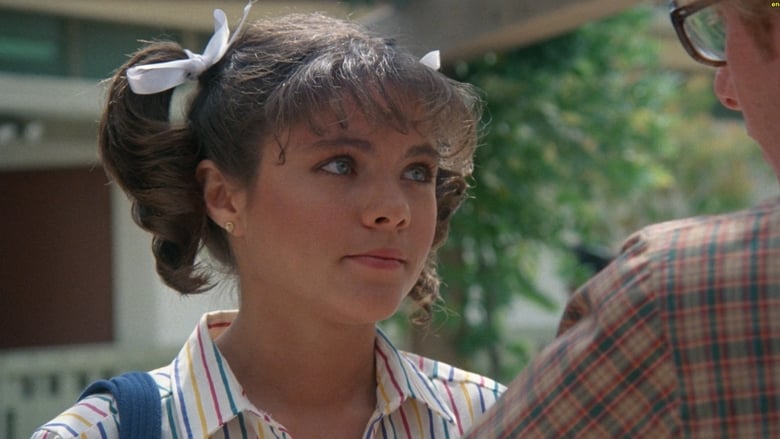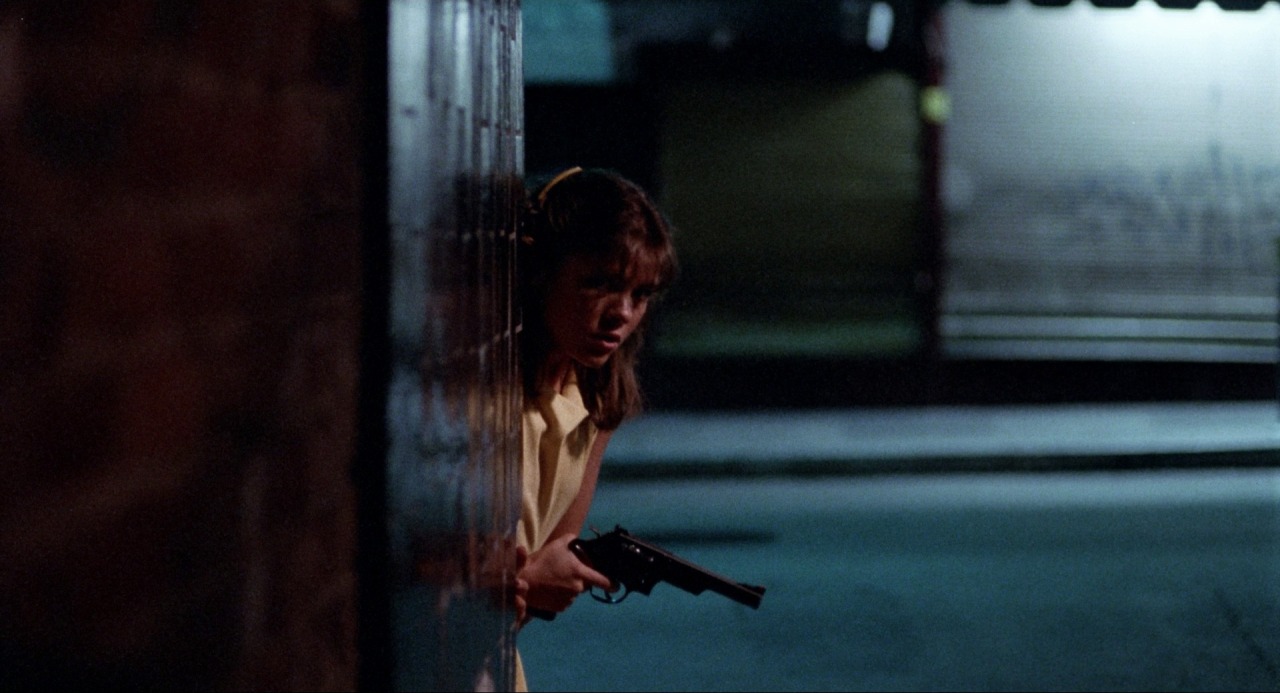← Back to Reviews

in

Given the sleazy subject matter, I was surprised by the amount of warmth in Angel. This is a movie about a child prostitute whose friends are murdered by a serial killer, yet in delivering these salacious elements, the movie achieves an impressive level of dramatic weight. There's a surprising amount of attention devoted to the social dynamic on the street, between the prostitutes and the other performers, including a Charlie Chaplin impersonator and a kindly old cowboy played by Rory Calhoun. These characters are likable individuals with real personalities who form something of a family with the heroine played by Donna Wilkes. Even more surprisingly, the movie does a respectable job with its LGBT characters, including an old trans prostitute played by Dick Shawn and a lesbian landlady played by Susan Tyrell. Are they broadly drawn? Yes, but the movie shows a welcome amount of compassion toward them - they're a source of some humour but not the butt of the joke. You get the sense that Hollywood Boulevard isn't just a hive of scum and villainy like the premise would suggest, but a living, breathing community. A good amount of credit goes to the cinematography by Andrew Davis, who is no great visual stylist but brings some of the same feel for location that would distinguish Code of Silence, which he directed the following year. His work is particularly gripping in the climactic chase, where his reliance on handheld gives the action an almost vérité quality.
Movies like this tend to be a bit conservative in that the police are shown to be a stabilizing force, sometimes painting over the antagonistic relationship they've had with sex workers in real life, but again the movie deserves some credit for making its sympathetic cop character kind of an *******. Yes, he cares, but he's not someone the heroine can readily go to for help. Perhaps unintentionally, it shows the limitations of sympathetic outsiders to this world, in showing a brief yet completely unhelpful visit from a concerned teacher, whose attitude towards the heroine's LGBT friends comes off as entitled and condescending. After Savage Streets, this is the second movie I watched in a row that tries to link the ugly realities of the street with the comfortable domestic existence enjoyed by its assumed target audience, and specifically its impact on children (in the words of Helen Lovejoy... *wrings hands*).
Like that movie this is clumsy in making the connection, although the attempts to pass the cast off as teenagers are less egregious here. Wilkes looks with pigtails a little bit like what Steve Buscemi looks like with a baseball cap turned backwards, and her level of agency feels a bit implausible given her character's age, but she sells this about as well as it can be and turns in a pretty likable performance on the whole. There's also a kid who looks like Poindexter from Revenge of the Nerds and a couple of douchebags, one of whom wears a blazer despite the school not having a uniform, who antagonize the heroine. (The heroine wears a blazer as well, complete with gold buttons. Blazers seem to have been more popular among high schoolers in the '80s than the 2000s when I was of that age. Also beads. Between this and Savage Streets I've seen enough ****ing beads for a lifetime.) I did appreciate in delivering the skin quotient, it at least didn't excessively sexualize the heroine (it gets in a few superfluous shower scenes for that purpose), and has a welcome twist on the perfunctory rape scene you think it's setting up.
And of course, the movie wouldn't be very much fun if it didn't have a good villain, and the one here is a real sick ****. The movie lets you know what a sick **** he is almost right away. We see him stab a raw egg and drink the yolk while staring at a picture of his mother. He even eats the eggshells. What kind of a sick **** would do that? His own mother? And then we see him scrubbing himself with a sponge while his junk is facing an uncovered window? What if somebody sees? This ****ing sicko probably doesn't even care. And later we see him shaving his own head with a switchblade. Does he even own a razor? Probably, that's how ****ed up he is. The picture of the mother is likely the movie's attempt to draw a parallel between him and the heroine's own domestic situation, but given that he's mostly a blank slate (aside from the murders and ****ed up personal habits), it doesn't really land. But that's ultimately to the movie's benefit, as the movie's reframing of the slasher movie template keeps us firmly on the heroine's side as the bodies pile up. Not great by any means, but I was pleasantly surprised by how invested I was in this.
Angel (O'Neil, 1984)

Given the sleazy subject matter, I was surprised by the amount of warmth in Angel. This is a movie about a child prostitute whose friends are murdered by a serial killer, yet in delivering these salacious elements, the movie achieves an impressive level of dramatic weight. There's a surprising amount of attention devoted to the social dynamic on the street, between the prostitutes and the other performers, including a Charlie Chaplin impersonator and a kindly old cowboy played by Rory Calhoun. These characters are likable individuals with real personalities who form something of a family with the heroine played by Donna Wilkes. Even more surprisingly, the movie does a respectable job with its LGBT characters, including an old trans prostitute played by Dick Shawn and a lesbian landlady played by Susan Tyrell. Are they broadly drawn? Yes, but the movie shows a welcome amount of compassion toward them - they're a source of some humour but not the butt of the joke. You get the sense that Hollywood Boulevard isn't just a hive of scum and villainy like the premise would suggest, but a living, breathing community. A good amount of credit goes to the cinematography by Andrew Davis, who is no great visual stylist but brings some of the same feel for location that would distinguish Code of Silence, which he directed the following year. His work is particularly gripping in the climactic chase, where his reliance on handheld gives the action an almost vérité quality.
Movies like this tend to be a bit conservative in that the police are shown to be a stabilizing force, sometimes painting over the antagonistic relationship they've had with sex workers in real life, but again the movie deserves some credit for making its sympathetic cop character kind of an *******. Yes, he cares, but he's not someone the heroine can readily go to for help. Perhaps unintentionally, it shows the limitations of sympathetic outsiders to this world, in showing a brief yet completely unhelpful visit from a concerned teacher, whose attitude towards the heroine's LGBT friends comes off as entitled and condescending. After Savage Streets, this is the second movie I watched in a row that tries to link the ugly realities of the street with the comfortable domestic existence enjoyed by its assumed target audience, and specifically its impact on children (in the words of Helen Lovejoy... *wrings hands*).
Like that movie this is clumsy in making the connection, although the attempts to pass the cast off as teenagers are less egregious here. Wilkes looks with pigtails a little bit like what Steve Buscemi looks like with a baseball cap turned backwards, and her level of agency feels a bit implausible given her character's age, but she sells this about as well as it can be and turns in a pretty likable performance on the whole. There's also a kid who looks like Poindexter from Revenge of the Nerds and a couple of douchebags, one of whom wears a blazer despite the school not having a uniform, who antagonize the heroine. (The heroine wears a blazer as well, complete with gold buttons. Blazers seem to have been more popular among high schoolers in the '80s than the 2000s when I was of that age. Also beads. Between this and Savage Streets I've seen enough ****ing beads for a lifetime.) I did appreciate in delivering the skin quotient, it at least didn't excessively sexualize the heroine (it gets in a few superfluous shower scenes for that purpose), and has a welcome twist on the perfunctory rape scene you think it's setting up.
And of course, the movie wouldn't be very much fun if it didn't have a good villain, and the one here is a real sick ****. The movie lets you know what a sick **** he is almost right away. We see him stab a raw egg and drink the yolk while staring at a picture of his mother. He even eats the eggshells. What kind of a sick **** would do that? His own mother? And then we see him scrubbing himself with a sponge while his junk is facing an uncovered window? What if somebody sees? This ****ing sicko probably doesn't even care. And later we see him shaving his own head with a switchblade. Does he even own a razor? Probably, that's how ****ed up he is. The picture of the mother is likely the movie's attempt to draw a parallel between him and the heroine's own domestic situation, but given that he's mostly a blank slate (aside from the murders and ****ed up personal habits), it doesn't really land. But that's ultimately to the movie's benefit, as the movie's reframing of the slasher movie template keeps us firmly on the heroine's side as the bodies pile up. Not great by any means, but I was pleasantly surprised by how invested I was in this.
